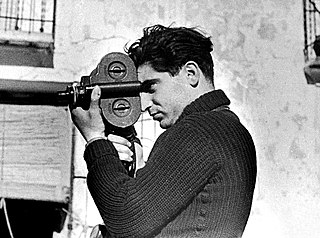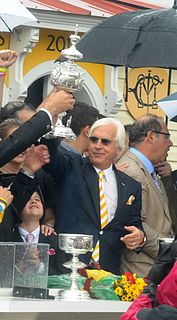A Quote by Robert Capa
The war correspondent has his stake - his life - in his own hands, and he can put it on this horse or that horse, or he can put it back in his pocket at the very last minute.
Related Quotes
I like my boy with his endless sweet soliloquies and iterations and his utter inability to conceive why I should not leave all my nonsense, business, and writing and come to tie up his toy horse, as if there was or could be any end to nature beyond his horse. And he is wiser than we when [he] threatens his whole threat "I will not love you."
I part of this great nation because my grandfather was born here, in Cincinnati, Ohio. He took a horse, back in 1895, and ride it all the way down to Guanajuato, looking for his American dream. No penny in his pocket, only dreams in his head. And he was an immigrant coming from the States into Mexico. And he found his American dream in Mexico.
Well could he ride, and often men would say, "That horse his mettle from his rider takes: Proud of subjection, noble by the sway, What rounds, what bounds, what course, what stop he makes!" And controversy hence a question takes, Whether the horse by him became his deed, Or he his manage by the well-doing steed.
He’s sort of a homeless horse,” I said. “I’m leaving for the airport in two seconds, and I won’t be back for a couple days. You can put the horse in the garage, but I don’t want that horse in my apartment.” “Who would put a horse in an apartment? That’s dumb.” “Where’s the horse staying now?” “My apartment.” “I can always count on you to brighten my day,” Ranger said. And he disconnected.
A tutor should not be continually thundering instruction into the ears of his pupil, as if he were pouring it through a funnel, but, after having put the lad, like a young horse, on a trot, before him, to observe his paces, and see what he is able to perform, should, according to the extent of his capacity, induce him to taste, to distinguish, and to find out things for himself; sometimes opening the way, at other times leaving it for him to open; and by abating or increasing his own pace, accommodate his precepts to the capacity of his pupil.
One might compare the relation of the ego to the id with that between a rider and his horse. The horse provides the locomotor energy, and the rider has the prerogative of determining the goal and of guiding the movements of his powerful mount towards it. But all too often in the relations between the ego and the id we find a picture of the less ideal situation in which the rider is obliged to guide his horse in the direction in which it itself wants to go.
He loves so wholly. It is his nature. He blinks, then tries to find the right response. "I-" he stumbles. "I'm so afraid, June. So afraid of what might happen to-" I put two fingers against his lips to hush him. "Fear makes you stronger," I whisper. Before I can stop myself, I put my hands on his face and press my mouth to his.




































